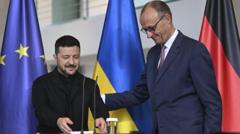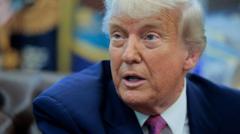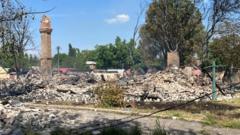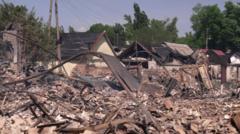In a significant diplomatic development, Germany's newly appointed Chancellor Friedrich Merz pledged assistance to Ukraine in producing long-range missiles, enhancing their defense capabilities against Russian aggression.
Germany's Merz Vows to Assist Ukraine in Long-Range Missile Manufacturing

Germany's Merz Vows to Assist Ukraine in Long-Range Missile Manufacturing
Chancellor Friedrich Merz announces support for Ukraine amid ongoing conflict with Russia.
Germany's new chancellor, Friedrich Merz, has committed to partnering with Ukraine to help produce long-range missiles as a countermeasure to ongoing Russian assaults. After a meeting with Ukrainian President Volodymyr Zelensky in Berlin, Merz stated, “We are prepared to discuss production and will refrain from revealing specifics to the public,” referencing the potential supply of Germany’s Taurus missiles. This missile boasts a range of 500km (310 miles), enabling strikes deeper into Russian territory.
Having assumed office only recently, Merz emphasized an increased commitment to supporting Ukraine, declaring that Western allies have removed any limits on the range of weapons provided to Kyiv. Although specifics about the Taurus missiles were not disclosed publicly during the press conference, Merz mentioned that a formal "memorandum of understanding" regarding the production will be signed by German and Ukrainian defense ministers later today.
The Kremlin has raised concerns about the implications of lifting restrictions on Ukraine's missile capabilities, labeling it a threatening shift that could jeopardize political negotiations. However, Merz clarified that this decision was taken collectively by Western allies several months ago.
In a parallel development, President Zelensky has proposed that future discussions for peace should involve a triad of leaders - himself, Donald Trump, and Vladimir Putin - while he remains open to alternative formats. Kremlin spokesperson Dmitry Peskov indicated that such a meeting could only proceed once "concrete agreements" are established between Russia and Ukraine.
Despite diplomatic discussions, military tensions persist, exemplified by Ukraine's latest major drone operations against Russian positions. As reported, over 900 drones were launched by Russia against Ukraine in a three-day offensive, prompting heightened warfare. Meanwhile, Russian forces are amassing troops along the northeast front, seizing villages and establishing what President Putin refers to as "security buffer zones."
This ongoing conflict, now in its fourth year, has left a devastating toll on Ukraine, with widespread destruction and significant loss of life, while Moscow currently controls a significant portion of Ukrainian territory, including Crimea. Zelensky has articulated frustration with Russia's perceived delays in the peace process, citing unfulfilled commitments following recent Istanbul talks. Peskov maintained, however, that the peace terms document is nearing completion.
Having assumed office only recently, Merz emphasized an increased commitment to supporting Ukraine, declaring that Western allies have removed any limits on the range of weapons provided to Kyiv. Although specifics about the Taurus missiles were not disclosed publicly during the press conference, Merz mentioned that a formal "memorandum of understanding" regarding the production will be signed by German and Ukrainian defense ministers later today.
The Kremlin has raised concerns about the implications of lifting restrictions on Ukraine's missile capabilities, labeling it a threatening shift that could jeopardize political negotiations. However, Merz clarified that this decision was taken collectively by Western allies several months ago.
In a parallel development, President Zelensky has proposed that future discussions for peace should involve a triad of leaders - himself, Donald Trump, and Vladimir Putin - while he remains open to alternative formats. Kremlin spokesperson Dmitry Peskov indicated that such a meeting could only proceed once "concrete agreements" are established between Russia and Ukraine.
Despite diplomatic discussions, military tensions persist, exemplified by Ukraine's latest major drone operations against Russian positions. As reported, over 900 drones were launched by Russia against Ukraine in a three-day offensive, prompting heightened warfare. Meanwhile, Russian forces are amassing troops along the northeast front, seizing villages and establishing what President Putin refers to as "security buffer zones."
This ongoing conflict, now in its fourth year, has left a devastating toll on Ukraine, with widespread destruction and significant loss of life, while Moscow currently controls a significant portion of Ukrainian territory, including Crimea. Zelensky has articulated frustration with Russia's perceived delays in the peace process, citing unfulfilled commitments following recent Istanbul talks. Peskov maintained, however, that the peace terms document is nearing completion.




















